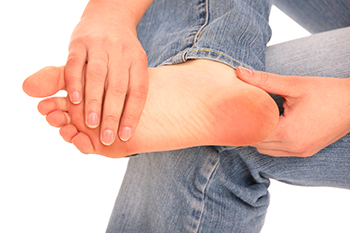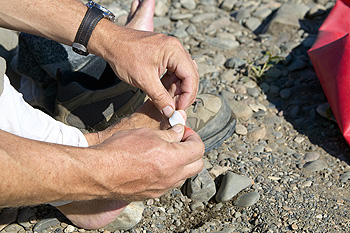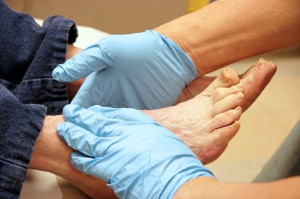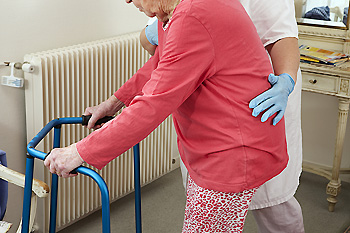Connect With Us
Blog
Items filtered by date: August 2023
Pain in the Ball of the Foot

Feeling pain in the ball of the foot can be a common issue. Sometimes this is caused by wearing shoes that are too narrow or tight and the metatarsals, or long bones in the feet, squish together and compress a nerve between the second and third toes. This affliction can also be due to small joints, bursa, stress fractures in metatarsal bones, sesamoids under the big toe, or issues with the big toe joint. Factors contributing to this pain include weight gain, increased physical activity, certain types of shoes, like high heels, sports that involve jumping or sprinting, and uneven muscle strength or unique foot shapes like high arches. To address such pain, it is essential to identify the underlying causes and reduce excessive pressure on the affected area. This can involve getting new shoes, using orthotics, and doing exercises to strengthen muscles. Early intervention is key to preventing more complications down the road, so it is suggested that if you are feeling pain in the ball of the foot, you make an appointment with a podiatrist for a proper diagnosis and treatment plan.
Foot Pain
Foot pain can be extremely painful and debilitating. If you have a foot pain, consult with one of our podiatrists from Granite State Podiatry Associates. Our doctors will assess your condition and provide you with quality foot and ankle treatment.
Causes
Foot pain is a very broad condition that could be caused by one or more ailments. The most common include:
- Bunions
- Hammertoes
- Plantar Fasciitis
- Bone Spurs
- Corns
- Tarsal Tunnel Syndrome
- Ingrown Toenails
- Arthritis (such as Gout, Rheumatoid, and Osteoarthritis)
- Flat Feet
- Injury (from stress fractures, broken toe, foot, ankle, Achilles tendon ruptures, and sprains)
- And more
Diagnosis
To figure out the cause of foot pain, podiatrists utilize several different methods. This can range from simple visual inspections and sensation tests to X-rays and MRI scans. Prior medical history, family medical history, and any recent physical traumatic events will all be taken into consideration for a proper diagnosis.
Treatment
Treatment depends upon the cause of the foot pain. Whether it is resting, staying off the foot, or having surgery; podiatrists have a number of treatment options available for foot pain.
If you have any questions, please feel free to contact our offices located in Manchester and Bedford, NH . We offer the newest diagnostic and treatment technologies for all your foot care needs.
Ways to Prevent Blisters of the Feet

Foot blisters are fluid-filled sacs that develop under the skin due to excessive pressure or friction. Often painful and uncomfortable, foot blisters can appear as red, swollen areas that protrude from the skin's surface. When dealing with foot blisters, early intervention is crucial. Once a blister forms, clean the area with antiseptic lotion and apply antibiotic ointment. Cover the blister with a clean, nonadhesive bandage, and change it daily to prevent infection. Soothe pain and itching with a cold, wet washcloth over the blister. Preventing blisters requires proactive steps. Wear well-fitted footwear, as shoes that fit improperly can lead to friction. Test shoes before purchasing to ensure a snug fit. Keep your feet dry to prevent the buildup of moisture, and fully dry your feet before wearing socks. Apply tape or bandages on areas of the shoe prone to rubbing. While foot blisters aren't emergencies, their discomfort can limit mobility and open the door to infections. If initial treatments don't suffice or signs of infection arise, it is suggested that you make an appointment with a podiatrist for advanced treatment options.
Blisters are prone to making everyday activities extremely uncomfortable. If your feet are hurting, contact one of our podiatrists of Granite State Podiatry Associates. Our doctors can provide the care you need to keep you pain-free and on your feet.
Foot Blisters
Foot blisters develop as a result of constantly wearing tight or ill-fitting footwear. This happens due to the constant rubbing from the shoe, which can often lead to pain.
What Are Foot Blisters?
A foot blister is a small fluid-filled pocket that forms on the upper-most layer of the skin. Blisters are filled with clear fluid and can lead to blood drainage or pus if the area becomes infected.
How Do Blisters Form?
Blisters on the feet are often the result of constant friction of skin and material, usually by shoe rubbing. Walking in sandals, boots, or shoes that don’t fit properly for long periods of time can result in a blister. Having consistent foot moisture and humidity can easily lead to blister formation.
Prevention & Treatment
It is important to properly care for the affected area in order to prevent infection and ease the pain. Do not lance the blister and use a Band-Aid to provide pain relief. Also, be sure to keep your feet dry and wear proper fitting shoes. If you see blood or pus in a blister, seek assistance from a podiatrist.
If you have any questions, please feel free to contact our offices located in Manchester and Bedford, NH . We offer the newest diagnostic and treatment technologies for all your foot care needs.
Nurturing Diabetic Feet with Knowledge and Caution

Proper foot care is of utmost importance for individuals with diabetes, as they are more susceptible to foot complications. Diabetic neuropathy, a condition that impairs nerve function, can reduce sensation in the feet, making it challenging to detect injuries or infections. Regular foot inspections, daily washing with lukewarm water, and thorough drying are essential to maintaining foot health. Applying moisturizer to prevent dry skin and wearing shoes that fit well may help to prevent potential wounds. Trimming toenails straight across and avoiding sharp corners can reduce the risk of ingrown toenails. It's crucial to avoid walking barefoot in addition to inspecting shoes for foreign objects before wearing them. By incorporating these simple, yet vital, steps into their routine, individuals with diabetes can safeguard their foot health and minimize the risk of serious complications. If you have diabetes, it is strongly suggested that you are under the care of a podiatrist who can help you to manage this condition.
Diabetic foot care is important in preventing foot ailments such as ulcers. If you are suffering from diabetes or have any other concerns about your feet, contact one of our podiatrists from Granite State Podiatry Associates. Our doctors can provide the care you need to keep you pain-free and on your feet.
Diabetic Foot Care
Diabetes affects millions of people every year. The condition can damage blood vessels in many parts of the body, especially the feet. Because of this, taking care of your feet is essential if you have diabetes, and having a podiatrist help monitor your foot health is highly recommended.
The Importance of Caring for Your Feet
- Routinely inspect your feet for bruises or sores.
- Wear socks that fit your feet comfortably.
- Wear comfortable shoes that provide adequate support.
Patients with diabetes should have their doctor monitor their blood levels, as blood sugar levels play such a huge role in diabetic care. Monitoring these levels on a regular basis is highly advised.
It is always best to inform your healthcare professional of any concerns you may have regarding your feet, especially for diabetic patients. Early treatment and routine foot examinations are keys to maintaining proper health, especially because severe complications can arise if proper treatment is not applied.
If you have any questions please feel free to contact our offices located in Manchester and Bedford, NH . We offer the newest diagnostic and treatment technologies for all your foot and ankle needs.
Exercise Is a Fall Prevention Method

People who fall or who have a fear of falling may benefit from having regular physical examinations done. This can help monitor existing medicines, as dosages may need to be adjusted as the body changes. It can also help to have regular eye examinations performed that can manage eyeglass prescriptions. Many elderly patients like to exercise and can feel their bodies becoming stronger. Exercising is an important fall prevention technique, and it may also help to increase balance. Many seniors enjoy practicing Tai Chi, which can make their legs stronger. Vitamin D may be added to the diet which may help improve bone, muscle, and nerve health. Additionally, there are methods that can be implemented in the home that can make it safer. These can include installing grab bars in the toilet and shower area and improving lighting in the living area. Falling can impact the feet, and can cause havoc in completing daily activities. If you would like to learn more about fall prevention techniques, it is suggested that you confer with a podiatrist who can provide you with useful information.
Preventing falls among the elderly is very important. If you are older and have fallen or fear that you are prone to falling, consult with one of our podiatrists from Granite State Podiatry Associates. Our doctors will assess your condition and provide you with quality advice and care.
Every 11 seconds, an elderly American is being treated in an emergency room for a fall related injury. Falls are the leading cause of head and hip injuries for those 65 and older. Due to decreases in strength, balance, senses, and lack of awareness, elderly persons are very susceptible to falling. Thankfully, there are a number of things older persons can do to prevent falls.
How to Prevent Falls
Some effective methods that older persons can do to prevent falls include:
- Enrolling in strength and balance exercise program to increase balance and strength
- Periodically having your sight and hearing checked
- Discuss any medications you have with a doctor to see if it increases the risk of falling
- Clearing the house of falling hazards and installing devices like grab bars and railings
- Utilizing a walker or cane
- Wearing shoes that provide good support and cushioning
- Talking to family members about falling and increasing awareness
Falling can be a traumatic and embarrassing experience for elderly persons; this can make them less willing to leave the house, and less willing to talk to someone about their fears of falling. Doing such things, however, will increase the likelihood of tripping or losing one’s balance. Knowing the causes of falling and how to prevent them is the best way to mitigate the risk of serious injury.
If you have any questions, please feel free to contact our offices located in Manchester and Bedford, NH . We offer the newest diagnostic and treatment technologies for all your foot care needs.
